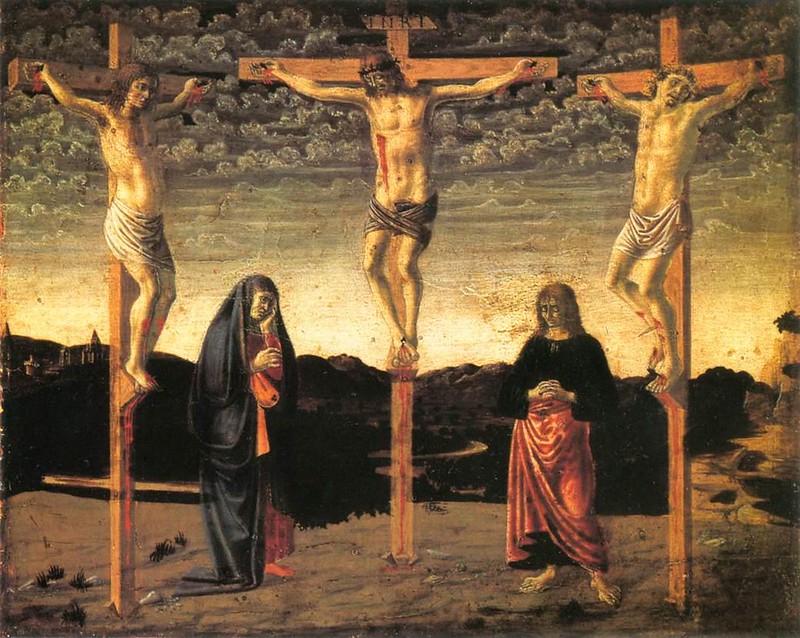The Cross as Counter-Script

The Cross as Counter-Script
Brian Zahnd
As Americans we are given a script from birth — it is our shared and assumed formula for the pursuit of happiness. Without even being aware of it we are scripted in the belief that our superior technology, our self-help programs, our dominant military, and our capacity to obtain consumer goods should guarantee our happiness. Said just so it sounds silly, but when it is communicated in the liturgies of advertising and the propaganda of state it becomes believable…and we do believe it. Give me a new iPhone, a motivational talk, a trillion dollar war machine, a Visa card, and I can be happy! For the most part the Americanized church has unconsciously bought into this script and concocted a compromised Christianity to endorse the script point for point. It’s Americanism with a Jesus fish bumper sticker. But in the end the desperate pursuit of the brass ring of happiness — even when “Christianized” by the prosperity gospel — leads to a shriveled and disappointed soul. In the final analysis the American script is shamed by the cross of Christ.
The Enlightenment promise that technology would lead to Utopia has been weighed in the balances of history and found wanting. It went up in smoke — literal smoke! — in the gray ashes of Auschwitz and a hideous mushroom cloud over Hiroshima. Gullible faith in the ability of technology to automatically produce a better world should now be seen as a naïve anachronism.
A Christian obsession with therapeutic self-help fads reveals how disconnected we are from substantive historic theology and the ancient practice of spiritual direction. Today we have pastors mimicking one another by replacing their pulpit with a bed and giving their congregation a “thirty-day sex challenge.” Please. These silly gimmicks oscillate between ludicrous and pathetic.
Superstitious reverence for all things military constantly verges on the idolatrous and prevents the church from being a prophetic people. Memorial Day is not on the church calendar and military color guards marching down church aisles with rifles on their shoulders should not be part of our liturgy.
Consumerism, as much as anything, has come to define much of America’s most visible expressions of Christianity. Take a quick stroll though “Christian TV Land” and you’ll see what I mean. This is what Janis Joplin mocked when she sang, “Oh Lord, won’t you buy me a Mercedes Benz.” The cross heaps shame on all of this.
The American prescription for happiness is the script we’ve been handed. But it’s a lie. It’s a false gospel, yet enormously popular. The only possible way to resist that dominant script is through the adoption of what Walter Brueggemann calls a counter-script. For the Christian that counter-script is the gospel of Jesus Christ — at the center of which stands a cross!
When we are trying to relocate the center of authentic Christianity we are led to Calvary. Jesus promised paradise, not to those who prioritize personal happiness, but to one who was dying on a cross beside him. Father John Behr closes his brilliant little book Becoming Human with this meditation on the cross.
“Our journey through this world, dying to this world as ‘Egypt,’ through baptism, then dying as we sojourn in the desert of this world by taking up the cross daily, refashions us as living human beings, human beings living in this world as God’s paradise at the center of which stand the cross, the tree of life. ‘Truly I say to you, today you will be with me in Paradise,’ says Christ to the one willing to be crucified with him. Are we ready, now, to live?” –Becoming Human by John Behr, pp. 108, 109
In contemplating the cross we find the counter-script to Americanized Christianity. In drawing near to the cross we find the portal to a deeper, richer, fuller Christianity. But the cross is a costly portal. The price of admission is death. It means losing your false life to find your true life. The path to paradise is often the path of suffering. If our chief goal is to avoid suffering, we will probably never find paradise. Paradise is not found in the mall, it’s found on the Easter side of Good Friday.
BZ
(The artwork is Crucifixion by Andrea del Castagno, 1450)